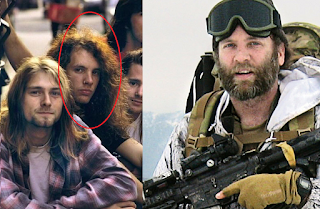-Jason Everman: The Guitarist from Nirvana who abandoned music to be a war hero
Jason Everman could have been a footnote in the history of grunge: the guy who was kicked out of not one but two of the biggest bands in the iconic '90s scene.
Dismissed by Kurt Cobain as a 'moody metalhead', and fired from Soundgarden because it 'wasn't working out', Everman, now 45, had his dreams of rock 'n' roll greatness snatched away as grunge reached its height.
-But he didn't want to dwell on what could have been - or be harping on about how he was once in Nirvana 20 years later. So in 1993, at the age of 26 and with a career touring the world with the biggest bands of the time already behind him, Everman joined the Army.
'... I thought this was it. This was going to be my identity,' Everman told The New York Times Magazine of his music career in a recent profile.
Nirvana's Krist Novoselic said, 'We had some great shows with Jason. But then things went south really fast.' In a band that was to become known for the dark moods of its front man, Everman was too depressive.
It was Everman who paid the $606.17 recording fee for Nirvana's debut album Bleach. They credited him as guitarist on the album's notes, even though he didn't play on the album, but they never did pay him back.
After the crushing blow of being kicked out of Nirvana, Everman stumbled into his dream gig - playing guitar for Soundgarden.
After a massive world tour, Everman turned up for what he thought was a band meeting - but instead he received his marching orders.
It seems his moods again were the reason his band-mates had difficulty working with him.
'He was funny and witty, and then a cloud would come over him. He would sit in the bus and be really mad with his headphones on all the time,' Soundgarden's road manager told The New York Times Magazine.
As a child, Everman's moods were also getting him in trouble so his worried grandmother sent him to a therapist, who also happened to be a guitar enthusiast. Everman picked up his first guitar in the offices of his therapist. Soon after, he discovered punk rock and spent much of high school playing in bands.
- A low period followed Everman's dismissal from Soundgarden before he picked himself back up, moved to San Francisco and joined another band, Mindfunk. It was there that he realized he needed to do something, 'something impossible'.
'I was in all the cool bands,' Everman told The New York Times Magazine. 'I was psyched to do the most uncool thing you could possibly do.'
The grunge guitarist with his head of tumbling strawberry blond curls, nose-ring and Motorhead t-shirts got on a bus bound for Army training camp at Fort Benning in Georgia to undergo the 61-day training course.
The Rangers are the Army's elite infantry unit; Everman was one month into his training when Cobain committed suicide and his commanding officers and recruits figured out who he was.
According to his former Army colleagues, Everman never mentioned his illustrious past, but somehow it always found him out.
After his first enlistment, Everman's ambitions hadn't been satisfied and he applied for the Special Forces. It was during training that he watched a plane hit one of the twin towers and realized he was going to war.
The New York Times Magazine profile describes Everman 'riding horseback with the Pashtun, helicoptering in for midnight raids, sitting at a base for days at a time with absolutely nothing to do. Everman saw Soviet tanks rusting in the Panjshir Valley. He smelled the poppy fields outside of Kandahar.'
In war, Everman became a rockstar soldier. His cabin is filled with badges honoring his service to his country, and photographs of him with the nation's political leaders.
'Throughout my adult life I have made the conscious effort to develop three aspects of who I am: the artist, the soldier and the philosopher,' Everman said.
-He left the military in 2006, and enrolled at Columbia University, studying philosophy. Everman graduated with a BA in Philosophy on May 20. According to a Columbia University profile of Everman, he has also worked as a commercial fisherman in Alaska and for a period lived as a monk in Nepal.
After his great achievements musically and in fighting for his country, it seems Everman is at last sated. His next move, he told The New York Times Magazine, may be something distinctly more ordinary.
-


Comentarios
Publicar un comentario